Summary 
Difficult two-toned drama - one half domestic tragedy, one half gypsy romance - is bookended by sensitively directed jealousy scenes and an expertly-paced conclusion. Dance and music-filled middle section favors slapstick humor, but the overall production is bolstered by excellent acting, especially the troubled royal couple and a swaggering Pirates of the Caribbean-style thief Autolycus.
Design
Directed by Deb Alley. Costume design by Rachel Laritz. Scenic design by Michael Franklin-White. Lighting design by R. Lee Kennedy. Sound design by Aaron Paolucci. Choreography by Greg Merriman.
Cast
Gerson Dacanay (Shepherd's Son), Michael Gamache (Antigonus), Melissa Graves (Hermione), David Kortemeier (Shepherd), John Taylor Phillips (Leontes), Thomas Anthony Quinn (Camillo), Jan Rogge (Paulina), Laura Rook (Perdita), Santiago Sosa (Autolycus), Stephen Spencer (Polixenes), Andy Talen (Florizel), Shaun Taxali (Mamillius).
Analysis
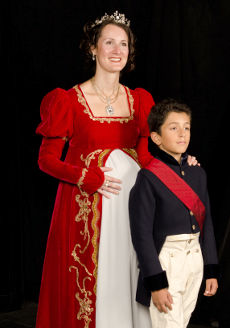
Deb Alley, artistic director of the Illinois Shakespeare Festival, helms a handsome outdoor The Winter's Tale, the first half a stark and moody domestic drama. Grayish-white tree branches are clustered upstage, lit with purple light, a few white blossoms visible. The branches are under-lit with white foot lights - pretty, but suggesting sterility and the coldness of winter - so shadows play against the stage walls. Skeletal trellises line the balcony, and a thin burnished-white metal staircase stands at stage right. The only other set décor is a dark serving table at stage left. A modern score of strings and thumping bass features haunting melodies, belying the warm orange and pink light that rises with 1.1. Polixenes and Leontes wear metallic garlands, the former silver and the latter gold, with Polixenes sporting Bohemian scarves of blue and green while Leontes appears the rigid statesman in red sash and black boots. Hermiones, visibly pregnant, wears a flowing red robe-like gown that accentuates her belly. She joins a stern-looking Leontes in a formal dance at center stage, four couples dancing around them. The court women wear floor-length gowns of white and cream with long gloves, and the men sport bronze-colored vests over puffy white shirts along with black knee-high boots. John Taylor Phillips' Leontes, resembling an intense Liev Schreiber, watches from downstage as Polixenes enlivens the formal affair with a game middle-aged attempt at a gypsy jig.
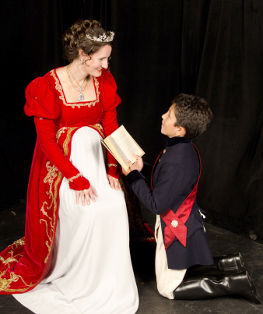
Alley depicts the 1.2 descent of Phillips' Leontes into angry jealousy with a well-paced succession of overlapping images. As the boy Mamillius delights in a gift - little cardboard figures on plastic stands - Polixenes makes known his intent to return to Bohemia: "there is no tongue that moves." Leontes observes Hermione coaxing Polixenes while he reviews and signs political documents with Camillo upstage left, then shifts downstage, dripping with sweat in the hot and humid mid-July air. He sputters - "too hot, too hot" - deriding their "practiced smiles" before indulging Mamillius in a staring contest. The boy is dressed like Leontes, including a red sash, and he mimics Leontes' posture. Leontes works himself ever deeper into suspicion - "the tenth of mankind would hang themselves" - and finally into violent conviction - "my wife is a hobby horse" - as he hurls his goblet across the stage. Although Camillo reluctantly agrees to murder by poison, he informs the shocked Polixenes of the danger, taking his hand and kneeling before rising to lead him to safety.
The 2.1 confrontation is blocked to suggest Leontes' underlying sexism, with Hermione and her ladies gathered at stage right with Mamillius as Phillips' Leontes storms onstage left - "I have drunk and seen the spider" - with his five male advisors. When he forcibly removes Mamillius from Hermione, yanking him across to the men's side of the stage, Hermione stoops to fondly retrieve the boy's dropped little toy. Leontes moves downstage but does not look at his wife as she pleads her innocence, and he dispatches Cleomenes and Dion - pointedly, two women - to consult the Oracle of Apollo at Delphi. He sits troubled in near darkness for 2.2, his shirt open and his sleeves rolled up, near tears in his imagined injury, and in 2.3 he endures Paulina, who bears his newborn daughter Perdita. After railing against the hesitancy of his advisors - "a nest of traitors" - he denounces his daughter - "this brat is none of mine" - and pushes Paulina, a matronly woman in an emerald grown with black lace fringes and gloves, to the ground. Paulina rises to challenge him - "it is the heretic that makes the fire" - and he vacillates, first ordering his child burned then just banished.
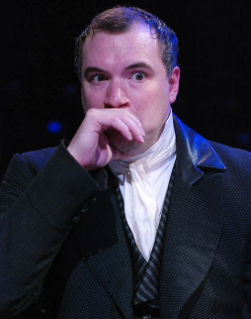
The 3.2 trial's drama is fueled by Melissa Graves' eloquent Hermione, tall and thin, appearing to be sickly, helped to a center stage pedestal by Paulina. Graves' Hermione is impressive in her emotional self defense - "I am like one infectious" - while never becoming shrill or melodramatic. She begins slowly, her "I appeal to your own conscience, sir" causing Phillips' Leontes to flinch as if slapped, then close his eyes. Hermione builds into an impassioned wail, her hands shaking visibly as she calls for the decree of the Oracle. Cleomenes and Dion swear upon a jeweled sword then kneel downstage left by a small chest, laying their hands upon it and opening it to rising music. The two women chant, overlapping each other in a dramatic echo - "Hermione is chaste; Polixenes is blameless; Camillo is a true subject; Leontes is a jealous tyrant" - and as the music stops, all eyes turn to the motionless Leontes. He of course dismisses the women and the Oracle, and the scene concludes in a flurry, Alley again expertly layering events: a messenger arrives to announce that Mamillius has died, and Phillips' Leontes turns away in awful realization - "Apollo is angry" - as Hermiones collapses; Leontes swears daily atonement - "I'll reconcile myself" - ruing his treatment of Polixenes - "how he glisters through my rust" - and when Paulina reveals that Hermione has also died, he falls to his knees and weeps.
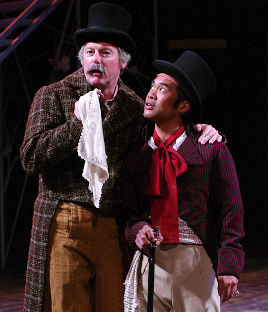
3.3 provides a transition from the cold domestic tragedy of Sicilia, as Antigonus enters with a basket carrying newborn Perdita, cowering in thunder sound effects and eerie purple midnight light. He embraces the child in his arms, leaves her treasures, and covers her with the coat off his back, but flees with high-pitched screams from the amplified growl of an approaching bear. The arrival of the comic Shepherd ushers in a far more light-hearted tone for the production, the actor one of the easily recognized good old boys from the concurrently-running Complete Works of Shakespeare (Abridged). He plays peek-a-boo with Perdita, and his Son, a vastly overplayed hyper-kinetic buffoon, runs onstage, then back off, then on again, repeatedly shouting a frantic "hello!" before stopping to greet the Shepherd with a smarmy and quiet, "hello." They "ssh" each other as well as Perdita, their silly interaction feeling as if it comes from an altogether different production, light years from the chilly drama of the Sicilian scenes in The Winter's Tale.
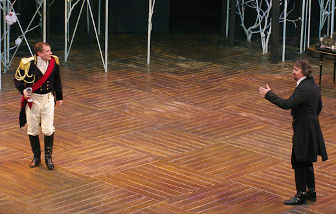
After an intermission that includes moody guitar instrumentals, the blossoms of the upstage tree branches glow with white light as Polixenes and Camillo enter, sixteen years later, although the former wears the exact same clothing as in the first act and the latter's only sign of aging is a pair of reading glasses. The 4.3 arrival of Santiago Sosa's Autolycus - a Johnny Depp-like gypsy straight from The Pirates of the Caribbean - brings a sudden splash of energy and color. Swarthy, black-haired, dark-eyed, and handsome, he is drunkenly expressive, clad all in brown, open-shirted with laced-on boots. Sosa's Autolycus assumes various poses of a robbery victim before finally attracting the attention of a passerby Clown, here the Shepherd's Son. Sosa nearly steals the second half of the production, along with everything else, including the Son's money, his hat, and his scarf. He lifts the Son's picnic basket, tosses the Clown an apple, then speaks directly to the audience in waggish asides from downstage center.
The very long 4.4 presents a musical Bohemia, as young dancers swarm the stage to spirited shouts, the girls wearing scarves and flowers in their hair, a swirling blur of green and yellow and orange dresses, the boys in sashes and loose-fitting clothing. They twirl and dance and perform line kicks, then set up a picnic as Florizel woos Perdita and a boy plucks at a mandolin. When the Shepherd arrives with the disguised Polixenes and Camillo - separating Florizel from Perdita with a paternal wave of his hand - the girls recline, their heads in boys' laps, and they all drink from a bottle they pass around, and feed each other, two of them competing lustily for the attention and affection of the Shepherd's Son. To the shout of "strike up!" the pseudo-1960s hippie kids begin another dance, five young couples spinning circles across the stage in a clap-along as Perdita emerges in the middle of the circle to bow to applause. She then slow dances with Florizel, and they murmur lovingly to one another.
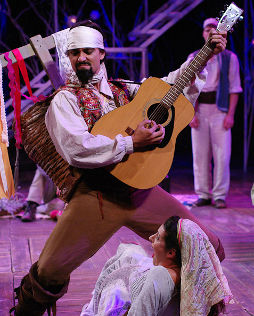
The tone feels unfocused - romance, free love, gypsy thieves, parental spying, slapstick humor - in comparison with the laser-like precision of the Sicilian first half, and some of the humor plays too broadly. A messenger rushes onstage shouting "master!" repeatedly, running right past his master then back across the stage and halfway up the metal stairs before recognizing him. The Shepherd and his Son, with timing that echoes their work in Complete Works, growl at each other and "ssh" one another, mugging and giving timed "oohs" and "aahs" and "mmms" as Autolycus affects the airs of a courtier. Sosa's white head-banded Autolycus sings his own folk song, wielding an acoustic guitar like a modern rock god, thrusting his hips over a Bohemian girl and posing teen idol for others. The Bohemians pound rhythm on the stage for the song - "come to the peddler, money is a meddler" - before running en masse offstage, then returning sheepishly to pick up the remains of the picnic. Some seriousness returns when Polixenes moves to confront his son Florizel, but his fake beard comes loose from his face in the heat and humidity, and the actor must gamely hold it to his jaw and continue the scene. When he finally can hurl the fake beard to the stage and reveal himself, Florizel remains defiant - "I a heir to my affection" - in his love for Perdita.
Alley returns focus to Sicilia for Shakespeare's Act 5 with a simple set change, the lighting now blue, the mood once again subdued and somber. Phillips' Leontes wears a long purple cloak with black fur fringes and black boots, and he vows to be a peacemaker between Florizel and his father, proving himself a truly changed man. In a brief 5.2, the Shepherd and his Son are now courtiers in hats and long coat tails, the former with a handkerchief and the latter with a cane. Sosa's Autolycus vows to mend his ways, kneeling to kiss the Son's hand but making off with his ring, and as the Son exits, Sosa's Autolycus slyly takes both his hat and cane. Although Shakespeare's text inexplicably omits the dramatic reunion of Leontes with Perdita - father and daughter, after sixteen years - as well as the reconciliation with boyhood friend Polixenes, Alley accounts for the loss with a dramatically satisfying conclusion.
A supposed statue of Hermione stands upstage left for 5.3, bathed in blue-and-white light upon a pedestal with footlights. When Paulina moves the statue to center stage, the cast all gasp in wonder, Leontes visibly distracted - "let no man mock me for I will kiss her" - as Paulina intones to low chords, "music wake her!" Alley concludes The Winter's Tale with a fluid progression of emotional stage pictures: the statue of Hermione stirs and everyone jumps back, startled, while Leontes falls to his knees; Hermione steps off the pedestal and reaches for Leontes, who rises in tears and embraces her gently; Paulina guides Hermione - "turn, good Lady, our Perdita is found" - as mother meets weeping daughter for the first time in sixteen years; the good servant Camillo grasps Hermione's hand; the gracious Polixenes kneels before Hermione to kiss her ring; and after the remainder of the cast exits, Hermione and Leontes stand alone onstage to rising music, and when she silently raises her hand to his, he gently takes it and they walk offstage together.